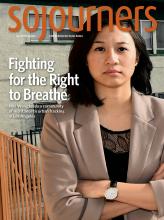ONE OF THE HARDEST things about being an immigrant and advocate for immigrants is an unspoken assumption that immigrating for strictly economic reasons is not as worthy of admission (and compassion) as doing so to flee war or persecution. Historically, this made refugees the “good immigrants,” until the current administration began to stoke fear against them. I love that Sarah Quezada turns that idea on its head by sharing the story of her relationship and marriage to an undocumented immigrant who didn’t leave his country for anything other than more opportunities and, to some extent, adventure.
Quezada tells a story that is part memoir, part biblical reflection, and part policy and data. She relates how she fell in love with and married an undocumented immigrant, Billy. As they make their way through the maze of the U.S. immigration system, she learns what immigrants know through experience: Gaining legal status is a complex, expensive, and lengthy process. She also reminds readers that many immigrants don’t have options to gain legal status, which might shock those who instruct immigrants just to “get in line and wait.”
What makes the story compelling is Quezada’s own hospitable rhetoric; it is easy to identify with her as she acknowledges knowing next to nothing about immigration before she began dating Billy. In fact, she barely knew people different from herself prior to a move to an urban Los Angeles neighborhood. The gentle humility of her storytelling makes this a book you can recommend to Christians new to the immigration debate. They will learn and come to greater awareness, as Quezada herself does through her journey.
Read the Full Article

